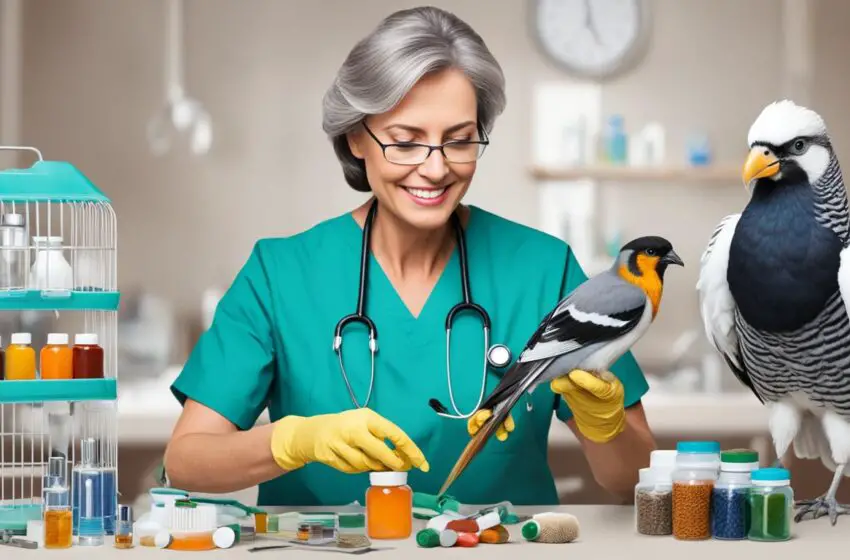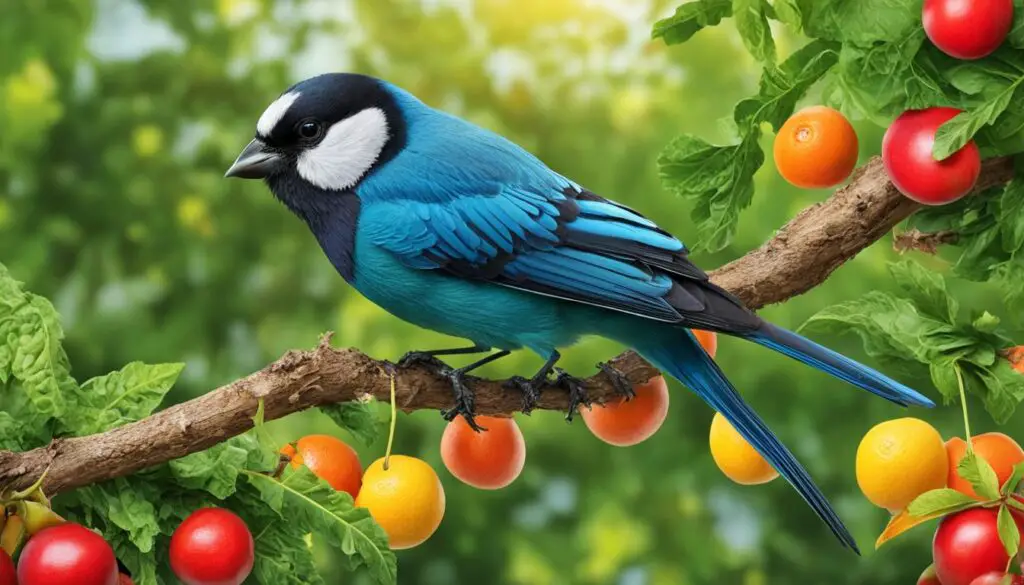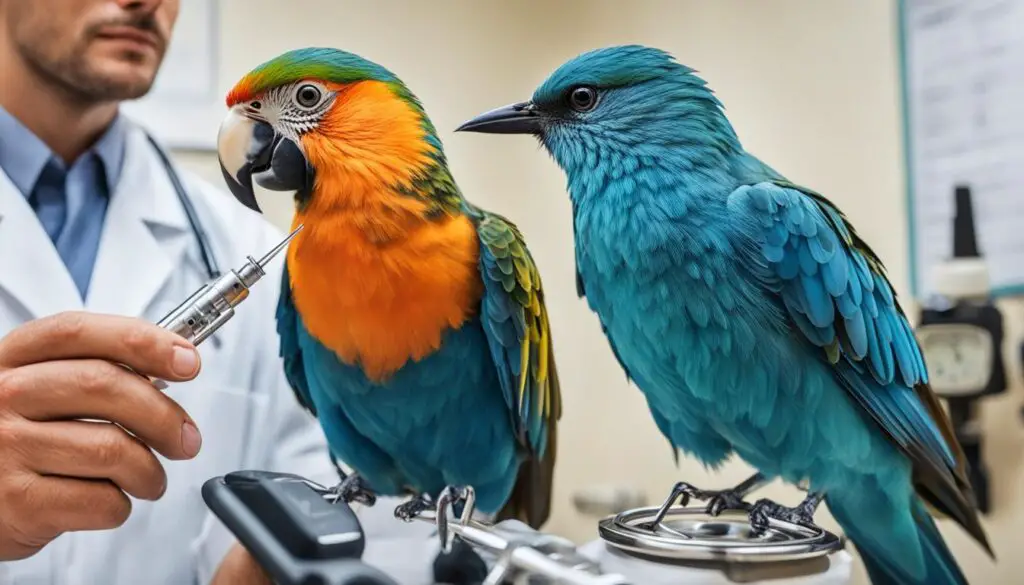Comprehensive Healthcare Guide for Pet Birds

Pet birds require essential healthcare to ensure their well-being and longevity. As a bird owner, it is crucial to understand the specific needs of your feathered companions and provide them with comprehensive care. In this pet bird healthcare guide, I will provide you with valuable tips and strategies for keeping your avian friends healthy and happy.
Key Takeaways:
- Understanding the unique healthcare needs of pet birds is essential for providing proper care.
- A balanced and nutritious diet is crucial for maintaining the overall health of pet birds.
- Preventive care, including regular veterinary check-ups, plays a vital role in keeping pet birds healthy.
- Maintaining a clean and safe environment is crucial to prevent accidents and diseases.
- Follow this comprehensive healthcare guide to ensure your pet birds thrive and lead a happy life.
Understanding the Unique Needs of Pet Birds
Pet birds have specific healthcare requirements that set them apart from other pets. It is vital to understand these needs in order to adequately care for them and ensure their well-being. By addressing their unique healthcare needs, we can promote their overall health and happiness.
Common bird ailments can arise if their healthcare needs are not met. These ailments include respiratory issues, feather problems, and nutritional deficiencies. Recognizing the signs of these conditions is crucial for early intervention and effective treatment.
Birds and Respiratory Issues
Respiratory issues are a common concern for pet birds. Their delicate respiratory systems are highly sensitive to airborne contaminants, such as particles from household cleaners, cooking fumes, and cigarette smoke. Exposure to these pollutants can lead to respiratory infections, sneezing, coughing, or difficulty breathing.
Preventing respiratory problems involves maintaining a clean and dust-free environment, free from any potential irritants. Regular cage cleaning and providing fresh air circulation can significantly reduce the risk of respiratory ailments.
Feather Problems in Birds
Feather problems can be indicative of both internal health issues and external factors. Birds may exhibit feather loss, plucking, or abnormalities in texture, color, or shape. These issues can be caused by underlying health conditions, stress, improper diet, or inadequate grooming.
It is crucial to provide a nutritious and balanced diet for pet birds to ensure healthy feather growth. Consult with an avian veterinarian to determine the best diet for your bird’s specific needs. Regular grooming, such as preening and bathing, helps maintain feather health and prevent problems like feather mites or dry skin.
Nutritional Deficiencies in Birds
Nutritional deficiencies can arise if a bird’s diet lacks essential nutrients. These deficiencies can lead to a weakened immune system, poor feather quality, and reduced overall health. Common nutrient deficiencies in birds include vitamin A, calcium, and protein.
A varied and balanced diet is crucial to meet a bird’s nutritional requirements. This includes providing a mix of high-quality bird pellets, fresh fruits and vegetables, and occasional treats suitable for their species. Consult with an avian veterinarian for specific dietary recommendations based on your bird’s breed and individual needs.
By understanding the unique needs of pet birds, we can provide them with the specific healthcare requirements they require. This knowledge empowers bird owners to prevent common bird ailments and promote their bird’s overall health and well-being.
Maintaining a Healthy Diet for Pet Birds
A healthy diet is crucial for the overall health of pet birds. Just like humans, birds require a balanced diet rich in important nutrients to thrive and stay healthy. Providing them with the right food not only ensures proper nutrition but also supports their immune system, bone health, and overall well-being.
When it comes to bird diet, there are several important nutrients that should be included to meet their specific dietary needs. Vitamin A is essential for maintaining healthy feathers, skin, and eyes. Calcium is necessary for strong bones and eggshell formation in breeding birds. Protein is important for muscle development and maintenance.
So, what should you feed your feathered friend? Opt for high-quality bird food that is specially formulated to meet their nutritional needs. Look for brands that offer a balanced blend of seeds, pellets, and fruits. It’s important to choose a variety of food options to ensure a well-rounded diet.
Selecting Suitable Bird Food
When selecting bird food, make sure it is appropriate for your specific bird species. Different species have different dietary requirements, so it’s important to choose food that meets their specific needs.
- Seeds and Grains: High-quality seed mixes can be a great source of essential nutrients for birds. Look for mixes that include a variety of seeds, such as millet, sunflower seeds, and safflower seeds.
- Pellets: Pelleted bird food is designed to provide a balanced diet in a convenient form. It contains a mix of essential nutrients and is formulated to meet the dietary needs of pet birds.
- Fruits and Vegetables: Fresh fruits and vegetables should also be included in your bird’s diet. Some safe options include apples, carrots, leafy greens, and berries. Just make sure to remove any seeds or pits that could be harmful to your bird.
It’s important to note that a healthy bird diet should also include treats and supplements in moderation. However, ensure that these additions do not compromise the overall balance of their diet.
Creating a Balanced Bird Diet
To create a well-rounded diet for your pet bird, it’s important to focus on variety and moderation. Providing a mix of seeds, pellets, fruits, vegetables, and occasional treats can help fulfill their nutritional needs.
Here are a few tips to keep in mind while crafting a balanced bird diet:
- Offer a variety of food options to provide different textures, flavors, and nutrients.
- Rotate the types of fruits and vegetables you offer to ensure a diverse range of vitamins and minerals.
- Monitor your bird’s food intake and adjust portion sizes as needed to prevent overeating or undernourishment.
- Consult with a veterinarian or avian expert for specific dietary recommendations tailored to your bird’s species and individual needs.
Remember, a healthy bird is a happy bird. By providing a balanced and nutritious diet, you are investing in your pet’s long-term health and well-being.

Considered Nutrients for Pet Birds
| Nutrient | Function | Sources |
|---|---|---|
| Vitamin A | Promotes healthy feathers, skin, and eyes | Carrots, sweet potatoes, mangoes |
| Calcium | Supports bone health and eggshell formation | Leafy greens, broccoli, fortified bird pellets |
| Protein | Essential for muscle development and maintenance | Seeds, nuts, legumes |
Preventive Care and Regular Veterinary Check-ups
Preventive care is a crucial aspect of ensuring the overall health and well-being of your pet birds. By taking proactive measures and scheduling regular veterinary check-ups, you can detect and prevent potential health issues before they become serious. Regular vet visits encompass not only routine examinations but also important vaccinations that offer protection against common bird diseases.
Vaccinations are an essential part of preventive bird healthcare. They help boost the immune system and safeguard your feathered companions against infectious diseases that can be devastating to their health. Common vaccinations for pet birds include avian polyomavirus, avian influenza, and psittacine beak and feather disease. Your avian veterinarian can recommend the appropriate vaccinations based on the species and specific health needs of your birds.
During the regular veterinary check-ups, your avian veterinarian will conduct a comprehensive examination to assess your birds’ overall health, check for any visible signs of illness, and provide necessary treatments or preventive measures. These check-ups also give you the opportunity to discuss any concerns or questions you may have regarding your birds’ health and well-being.
Scheduling regular vet visits for your pet birds is particularly important because birds are known to mask signs of illness. By the time symptoms become noticeable, the underlying health issue may have already progressed. Therefore, routine check-ups can help identify potential health problems in their early stages, allowing for prompt intervention and treatment.
“Regular veterinary check-ups and vaccinations are fundamental to preventive bird healthcare. They enable early detection and intervention, ensuring your feathered friends stay healthy and happy.”
To ensure a seamless and consistent healthcare regimen for your pet birds, it is crucial to establish a good relationship with an avian veterinarian who specializes in bird care. They have the expertise and experience to provide the best guidance and care for your feathered companions.
Benefits of Preventive Care and Regular Veterinary Check-ups:
- Early detection and prevention of potential health issues
- Timely administration of necessary vaccines
- Comprehensive examinations to assess overall health status
- Tailored medical advice and recommendations for your specific bird species
- Opportunity to address any concerns or questions about your birds’ health

| Benefits of Preventive Care | Benefits of Regular Veterinary Check-ups |
|---|---|
| Reduces the risk of infectious diseases | Early detection of hidden health issues |
| Enhances the overall longevity and quality of life | Guidance on appropriate diet and nutritional needs |
| Avoids costly veterinary treatments in the long run | Protection against common bird diseases through vaccinations |
Maintaining a Clean and Safe Environment
A clean and safe environment is essential for the health and well-being of pet birds. It helps prevent the spread of diseases and reduces the risk of accidents. As a responsible bird owner, it’s important to prioritize bird cage sanitation, safe bird toy selection, and birdproofing your home. Here are some tips to help you maintain a clean and safe environment for your feathered companions:
1. Bird Cage Sanitation
Regularly cleaning your bird’s cage is crucial for their health. Keep the cage clean and free from waste buildup to prevent bacterial and fungal infections. Here’s an easy step-by-step guide to clean your bird’s cage:
- Remove your bird from the cage and place them in a secure location.
- Take out all the toys, perches, and dishes from the cage.
- Dispose of any food debris and wipe down the dishes with a bird-safe disinfectant.
- Remove the cage liners and bedding material, and replace them with fresh ones.
- Thoroughly scrub the cage bars, corners, and trays with warm water and a bird-safe cleaning solution.
- Rinse everything thoroughly with clean water and allow it to dry completely before placing your bird back in the cage.
2. Safe Bird Toy Selection
Choosing the right toys for your bird is crucial for their mental stimulation and physical exercise. However, it’s important to select toys that are safe and appropriate for your bird’s size and species. Here are some guidelines for safe bird toy selection:
- Avoid toys with small, detachable parts that can be swallowed or cause choking hazards.
- Ensure the toys are made from bird-safe materials, such as untreated wood, natural fibers, and safe metals.
- Regularly inspect and replace damaged or worn-out toys to prevent any injuries.
- Offer a variety of toys to keep your bird engaged and prevent boredom.
3. Birdproofing Your Home
Creating a birdproof environment in your home is essential to prevent accidents and ensure your bird’s safety. Here are some steps to birdproof your home:
- Keep windows and doors closed or use screens to prevent escapes and protect your bird from outdoor dangers.
- Remove any toxic plants or household items that could be harmful to your bird if ingested.
- Cover electrical cords and outlets to prevent your bird from chewing on them.
- Securely close toilet lids to prevent drowning accidents.
- Supervise interactions between your bird and other pets to avoid any potential conflicts or injuries.
By following these tips, you can create a clean and safe environment that promotes the health and well-being of your beloved feathered friends.
Remember, the well-being of your pet bird depends on your commitment to providing a clean and safe environment. Take the necessary steps to ensure their health and happiness.
Conclusion
Proper healthcare is essential for the well-being of your pet birds. By understanding their unique needs, providing a healthy diet, scheduling regular vet visits, and maintaining a clean environment, you can ensure that your feathered friends lead happy and healthy lives.
One of the final tips for bird healthcare is understanding the importance of a balanced diet. Make sure to offer a variety of bird-friendly foods rich in essential nutrients such as vitamin A, calcium, and protein. This will help support their overall health and prevent nutritional deficiencies.
Regular veterinary check-ups are crucial for early detection and prevention of potential health issues. Don’t forget to schedule routine examinations and vaccinations to keep your birds protected and to address any concerns that may arise.
Lastly, maintaining a clean and safe environment is vital for the well-being of your pet birds. Ensure their cage is regularly cleaned, choose safe toys and perches, and birdproof your home to minimize any hazards or accidents.
By following these final tips for bird healthcare, you can provide the best care for your pet birds and enjoy their companionship for years to come.
FAQ
What are the unique healthcare needs of pet birds?
Pet birds have specific healthcare requirements that differ from other pets. It is essential to understand these needs to provide proper care for your feathered companions. Common bird ailments include respiratory issues, feather problems, and nutritional deficiencies.
What should be included in a healthy diet for pet birds?
A balanced diet is crucial for the overall health of pet birds. It should contain important nutrients such as vitamin A, calcium, and protein. This ensures their well-being and longevity. Providing suitable bird food options and creating a well-rounded diet is key to maintaining optimal health.
How does preventive care contribute to the health of pet birds?
Preventive care plays a vital role in keeping pet birds healthy. Regular veterinary check-ups, including vaccinations, can help detect and prevent potential health issues. By scheduling regular vet visits, you can ensure the early detection and management of any medical conditions.
How can I maintain a clean and safe environment for my pet birds?
A clean and safe environment is essential for the health and well-being of pet birds. Regularly sanitizing their cages, selecting safe toys, and birdproofing your home can prevent accidents and the spread of diseases. Following these steps will help create a nurturing environment for your feathered companions.
Why is proper healthcare important for pet birds?
Proper healthcare is crucial for the well-being of pet birds. By understanding their unique needs, providing a healthy diet, scheduling regular vet visits, and maintaining a clean environment, you can ensure your feathered friends lead happy and healthy lives. Following this comprehensive healthcare guide will help keep your pet birds thriving.



